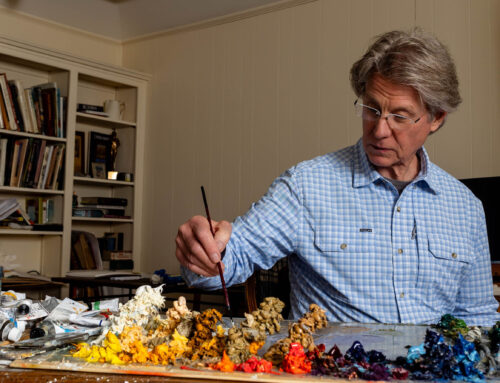Robert Squyres once led a six-day trek inside the Arctic Circle in , hiking across the tundra with reindeer for pack animals. He also has hiked the mountains of and kayaked in.
And for the past 10 years, he has led Lake Highlands’ Venture Boy Scout Troop 890 on three high-adventure treks a year, to Utah, Grand Canyon and Rocky Mountain National Park.
But 15 years ago, he could barely pedal his way around a city park.
“I took my son and his Cub Scout group on a bike ride around White Rock Lake , and it nearly killed me,” he says. “I was basically a chain-smoking, coffee-drinking, grossly underweight workaholic living on caffeine and nicotine, totally out of shape.”
The tiring trip served as a wake-up call for Squyres. He quit smoking and started working out and eating better. And today, at 69 years old, he leads at least half a dozen hiking and climbing treks a year.
And they’re far from being just a walk in the park.
Take, for example, his deep winter trek in Utah , which he leads just after Christmas each year.
“We use snowshoes to hike about a mile into the Uinta Mountains, about 35 miles southeast of Park City ,” he says. “We usually camp out in two to three feet of snow, which is always an interesting experience for Dallas people.”
While there, he teaches the Scouts to build ice caves, in which they sleep for two nights. He says it never gets below 30 degrees inside the snow caves, a temperature he adds is quite comfortable with the right clothing and sleeping bags.
“You put a few bodies in there, and it’s not too bad,” he says.
He also shows them how to make sophisticated toboggan trails, which they ride down on the sleds used for carrying their gear. Then, after three days in the wilderness, they pack up and head to a ski resort, for what he calls “the best snow in the world.”
For every trip he leads, Squyres plans all the routes and activities and even prepares all the food. He makes it all with a dehydrator, estimating that he makes 200-400 individual trail meals a year.
“He makes great beef jerky, sweet potato pie, fruit roll ups, stews, energy drinks, all sorts of things. He’s constantly shopping, buying bulk food on sale and storing it in his house. And he has very strict dietary guidelines for what he makes” says David Kent, who’s joined both of his sons on trips with Squyres.
“He’s always adding protein supplements and things to the food for energy.”
Another thing that he’s strict about, adds, is safety.
“His trips force you to extend yourself, to really push to the limit. But he’s very safety conscious,” he says. “He has a rule that at least one of the adults in every group be certified in Wilderness Advanced First Aid, taught by the Wilderness Medicine Institute. He had them come do a weekend training course in Dallas , and about 30 people went, largely at his insistence.”
Squyres offers no apologies on the subject.
“I’m obsessive on the subject of safety when I’m dealing with other people’s kids,” he says.
You might be thinking the man’s a heck of a good dad to plan and lead all those Scout trips. But his son hasn’t been in Scouts for years now.
Why, then, does he still do it?
“I rather love it,” he says. “I purely enjoy sitting on a mountainside, or on the ledge of a canyon.”
He also simply enjoys working with teenagers.
“I find that delightful,” he says. “I have always been fascinated with human development, and you can actually see significant development when you take a 14-year-old on a trek.
“Whatever undeveloped potential is there, whatever sense of responsibility they might have, it generally pops out the afternoon of the third day … normally about 3:47. It’s really incredible to watch.”
With all the exciting trips Squyres has taken in his time, he says he’s unable to name the best one.
“The most exciting trek is always the one I just got back from, or the one I’m about to go on,” he says.
And as long as he’s able, he’ll always be looking forward to the next one.
“I’m intrigued with the fact that I’m still climbing mountains, and I think I want to keep on climbing mountains as long as it feels good,” he says.
“I don’t like the thought of stopping. I’ll stop when it comes time, but it has not come time yet.”





